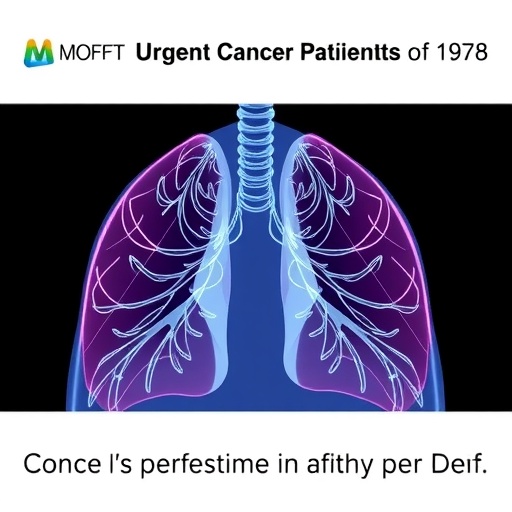In a groundbreaking advancement for personalized cancer care, researchers at the Moffitt Cancer Center have developed innovative machine learning models that combine patient-reported outcomes with data from wearable sensors to predict urgent care visits among patients undergoing systemic therapy for non–small cell lung cancer (NSCLC). This pioneering study, recently published in JCO Clinical Cancer Informatics, demonstrates that integrating multidimensional health data sources can substantially improve the ability to anticipate which patients are at heightened risk of treatment-related complications requiring urgent medical attention.
Systemic therapies, including chemotherapy, immunotherapy, and targeted agents, often bring about severe toxicities that can necessitate emergency interventions. Traditionally, predictions of such treatment complications have relied heavily on clinical and demographic data, which, while useful, provide limited real-time insight into a patient’s evolving condition. The current research leverages the power of Bayesian network modeling—a form of explainable machine learning—to synthesize diverse data streams, producing dynamic risk profiles that adapt as new information becomes available.
Central to the study is the integration of patient-reported outcomes (PROs), capturing subjective symptoms and quality-of-life metrics directly from the individuals affected. These self-reported data offer nuanced perspectives on symptom burden and functional status that clinicians may not fully capture during routine visits. Alongside PROs, wearable sensors such as Fitbit devices continuously monitor physiological parameters like heart rate and sleep quality, enabling the capture of subtle physiological changes that precede clinical deterioration.
The research involved 58 patients receiving systemic treatment for NSCLC who were monitored longitudinally using wearable devices while also completing standardized questionnaires capturing symptom trends and well-being. Employing Bayesian network models allowed the researchers to unravel complex interdependencies among clinical variables, self-reported symptoms, and sensor-derived metrics. Unlike “black box” machine learning approaches, Bayesian networks provide interpretability, offering clinicians transparent reasoning about how different factors contribute to increased risk.
Comparative analyses revealed that models incorporating wearable and patient-reported data significantly outperformed traditional clinical-only models in distinguishing patients at high versus low risk for urgent care visits. The addition of continuous physiological monitoring data enhanced early detection of subtle changes that presaged treatment complications, while PROs contextualized these signals within the patient’s subjective experience. This multimodal modeling approach marks a vital step toward more proactive, personalized oncology care that can mitigate adverse events before they escalate.
According to Dr. Brian D. Gonzalez, the study’s lead author and a researcher in Moffitt’s Department of Health Outcomes and Behavior, the integration of patient-generated health data with machine learning tools equips clinicians with actionable intelligence. “Our ambition is to provide real-time, interpretable predictions that prompt timely clinical interventions, ultimately improving patient outcomes and minimizing costly hospitalizations,” he explained. This fusion of technology and patient engagement offers a paradigm shift from reactive to preventative healthcare management in cancer treatment.
Co-author Dr. Yi Luo, an expert in Moffitt’s Department of Machine Learning, emphasized the critical role of explainability in fostering clinical trust and adoption. Unlike opaque predictive algorithms, Bayesian networks elucidate how variables such as sleep disturbances, symptom severity, laboratory findings, and vital signs interact to influence risk. This transparency not only facilitates shared decision-making but also aids clinicians in tailoring interventions based on the underlying drivers of toxicity risk, thereby enhancing precision medicine.
While the study was conducted at a single institution with a modest patient cohort, the promising results underscore the potential for broader application. Expanding these models to incorporate additional data layers such as molecular tumor profiles and larger, multi-center patient populations could further refine predictive accuracy and generalizability. Future directions also include validating these approaches in real-world clinical workflows, integrating machine learning insights into electronic health records for streamlined use.
The study exemplifies a growing trend in oncology toward harnessing “big data” and artificial intelligence to combat the complexities of cancer care. By bridging the gap between subjective patient experiences and objective physiological monitoring, this research empowers a more holistic and anticipatory approach to managing treatment-related risks. As wearable device technology becomes more ubiquitous and patient engagement tools evolve, such integrative predictive models could revolutionize not only lung cancer care but also the management of diverse chronic diseases.
Supported by the National Institutes of Health, this research reflects a multidisciplinary collaboration that spans oncology, behavioral science, and computational modeling. The innovative methodology offers a timely response to pressing clinical challenges, providing a blueprint for future studies aimed at leveraging multidimensional health data to improve cancer care delivery. As machine learning continues to mature in healthcare, explainability and patient-centeredness will remain paramount to translating data insights into meaningful clinical impact.
In conclusion, the integration of patient-reported outcomes and wearable sensor data into Bayesian network models represents a significant leap forward in predicting urgent care needs for NSCLC patients undergoing systemic therapy. This approach not only enhances predictive performance but also ensures transparency that fosters clinical confidence, potentially transforming how clinicians anticipate, and respond to, treatment-related toxicities. The potential to intervene earlier and personalize care pathways heralds a new era in oncology, where technology and human experience converge to improve outcomes and patient quality of life.
Subject of Research: People
Article Title: Using Bayesian Networks to Predict Urgent Care Visits in Patients Receiving Systemic Therapy for Non–Small Cell Lung Cancer
News Publication Date: September 15, 2025
Web References:
JCO Clinical Cancer Informatics article
Moffitt Cancer Center Lung Cancer
References:
DOI: 10.1200/CCI-24-00315
Image Credits: Moffitt Cancer Center
Keywords: Machine learning
Tags: Bayesian network modeling for risk assessmentemergency interventions in cancer therapyimproving quality of life for cancer patientsintegrating health data for better outcomesmachine learning in cancer carepatient-reported outcomes in oncologypersonalized cancer treatment advancementspredicting urgent care visits in lung cancerreal-time patient monitoring technologiessystemic therapy complications in NSCLCunderstanding treatment-related toxicitieswearable sensors in health monitoring





